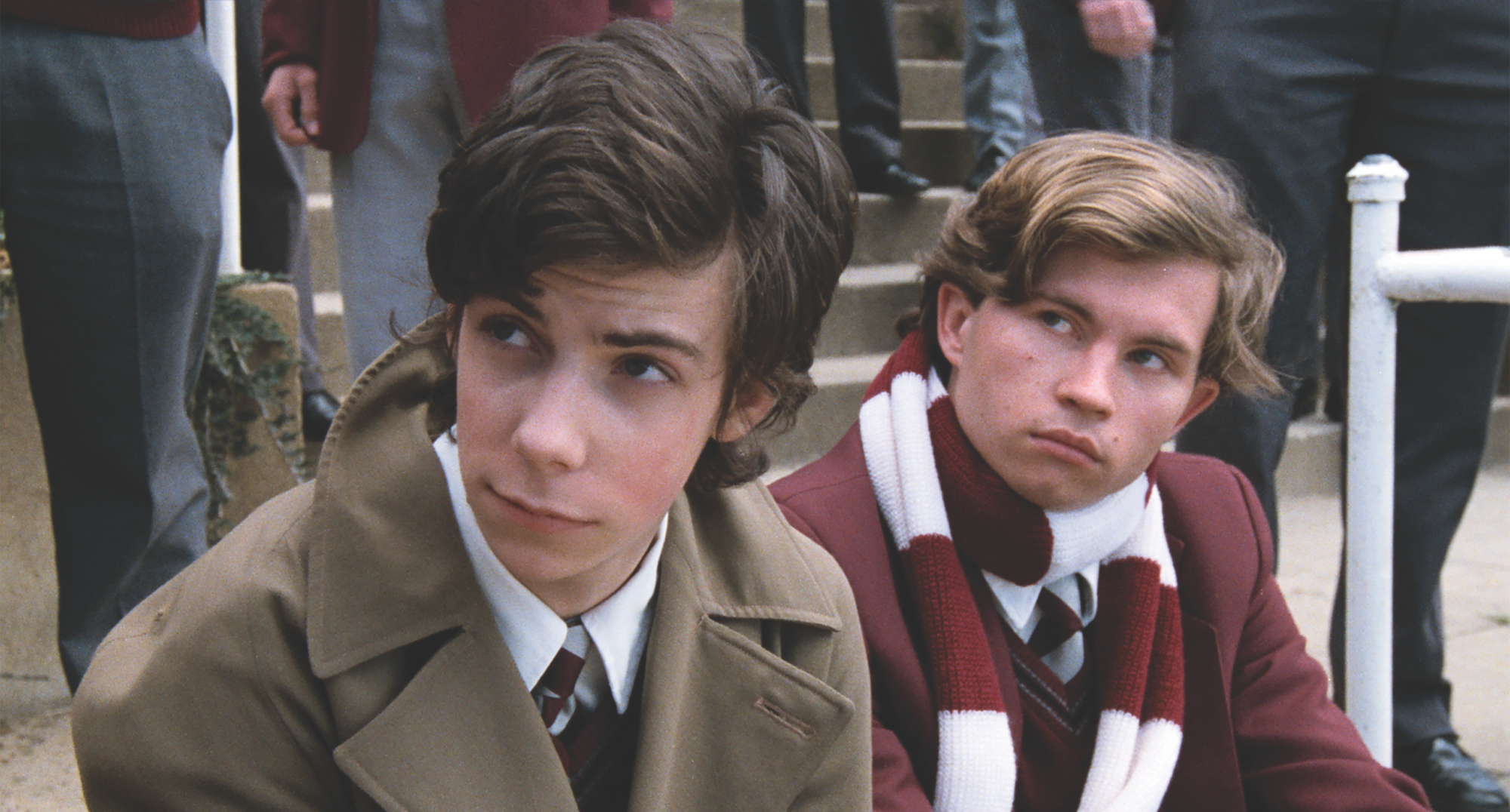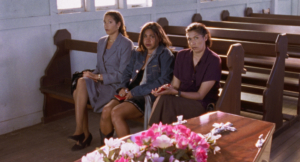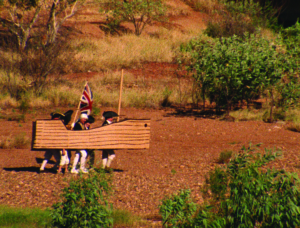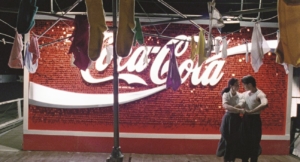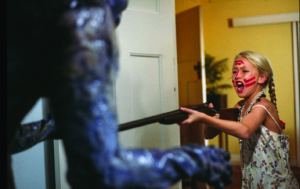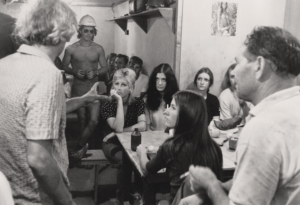The first on-screen encounter in writer and director John Duigan’s Flirting (1991) is far from flirtatious. Set to the lush instrumentation of Harry James’ orchestral rendition of ‘Sleepy Lagoon’, the original lyrics of which recall ‘two hearts in tune in some lullaby land’, the sequence humorously juxtaposes the nostalgia of the song’s intimate moonlit rendezvous with the film’s central character, Danny Embling (Noah Taylor), as he is receiving six strikes of the cane. As Danny silently withstands the vicious beating administered by his sadistic boarding-school headmaster, Mr Elliott (Marshall Napier), his gaze is drawn to two items in the latter’s cosy study: a hardback book rather aptly entitled The Great Australian Loneliness; and an errant snail that, seemingly in response to bearing witness to Danny’s punishment, retreats into its shell. In these opening moments, Duigan draws a link between the themes of desire, pain, loneliness and seclusion that underscore the disaffected poetry of adolescent malaise in his film.
The sequel to Duigan’s sensitive exploration of the blossoming of first love and the insularity of small-town life The Year My Voice Broke (1987), Flirting reunites the viewer with the former film’s protagonist. In 1965, three years following the conclusion of The Year My Voice Broke, Danny has left his dusty country town for the complicated social space of a rural, all-boys boarding school named St Albans College, having been sent there by his parents to avoid becoming ‘a delinquent’. St Albans is, however, not the space of gentlemanly refinement suggested by the formal uniform and stately grounds, but one in which adolescent male debauchery and bullying thrive. For the diminutive and intellectual Danny – who has unfortunately developed a stutter, favours European literature and openly rejects the hackneyed masculine pursuit of sport – the panopticon of boarding school provides only two options: ‘Either you abandoned yourself and became a herd animal, or you dug a cave deep into your head and skulked inside, peering through your eye sockets.’
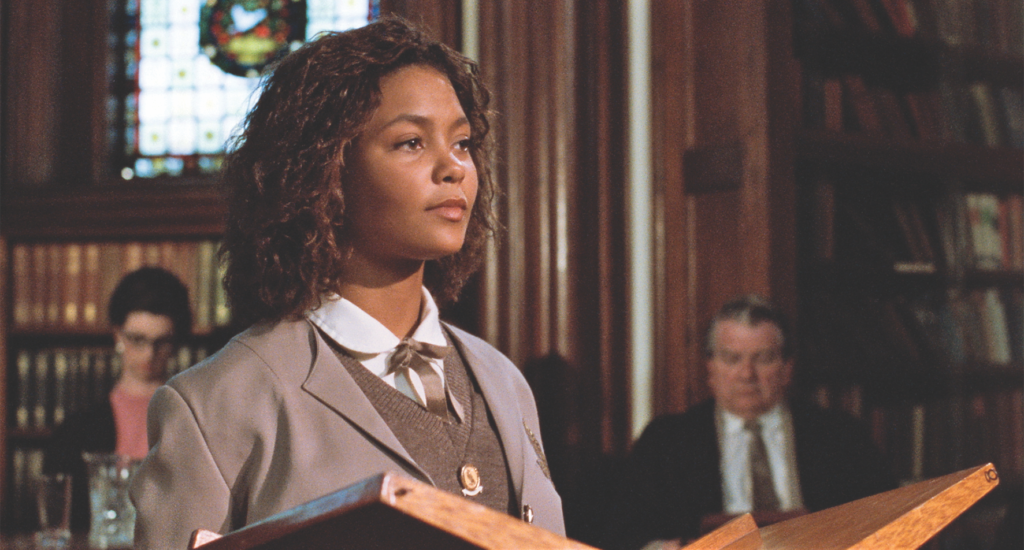
The only ‘source of major solace and inspiration’ in Danny’s dreary existence is the presence of St Albans’ sister school, Cirencester Ladies College. Viewed from his dormitory window, the all-girls boarding school resides on the other side of a vast lake, which creates a physical separation whereby the two schools appear to stare at each other ‘like brooding volcanoes’. The latest addition to this whirlwind atmosphere of teenage hormones is Thandiwe Adjewa (Thandie Newton), a beautiful, intelligent and worldly British-educated Ugandan girl who arrives at Cirencester after her father is posted to an academic position in Canberra. After Thandiwe observes Danny’s wry sense of humour and lack of interest in a rugby match, their romance plays out through shy glances in chapel, a heated debating competition between the two schools addressing Bertrand Russell’s (paraphrased) proposition that ‘intellectual pursuits are the highest form of human endeavour’, and a stolen kiss outside the school dance that Danny is prevented from attending due to the length of his hair.
Divided by the lake between the schools, which functions as the ‘sleepy lagoon’ of the film and recoups the lost romance in the opening scene when Danny receives a thrashing, Danny and Thandiwe’s courtship is forced to take an epistolary turn. Their communication is threatened, however, when one of Thandiwe’s letters is read aloud by the St Albans school bully, ‘Backa’ Bourke (Josh Picker), and news gets back to her. When Thandiwe refuses to speak to Danny during rehearsals for the schools’ joint theatrical rendition of the myth of Proserpina, he makes the ultimate gesture of feigning illness during dinner in order to row across the lake to see her, after which their flirtation resumes and continues to grow. Their burgeoning relationship is abruptly cut short, however, when Thandiwe’s parents return to Uganda during the Buganda crisis and her father is arrested. Before Thandiwe leaves Australia, she and Danny abscond from their respective schools and retreat to a room under the blinking neon lights of the Motel Tropicana under the name ‘Camus’, where their love is consummated prior to their being discovered naked in bed by unimpressed school staff. While Thandiwe returns to Uganda as planned and faces the ugly reality of armed conflict, Danny is expelled from St Albans and returns home. On opposite sides of the world, Danny and Thandiwe continue to write to each other in the hope that they will one day meet again.
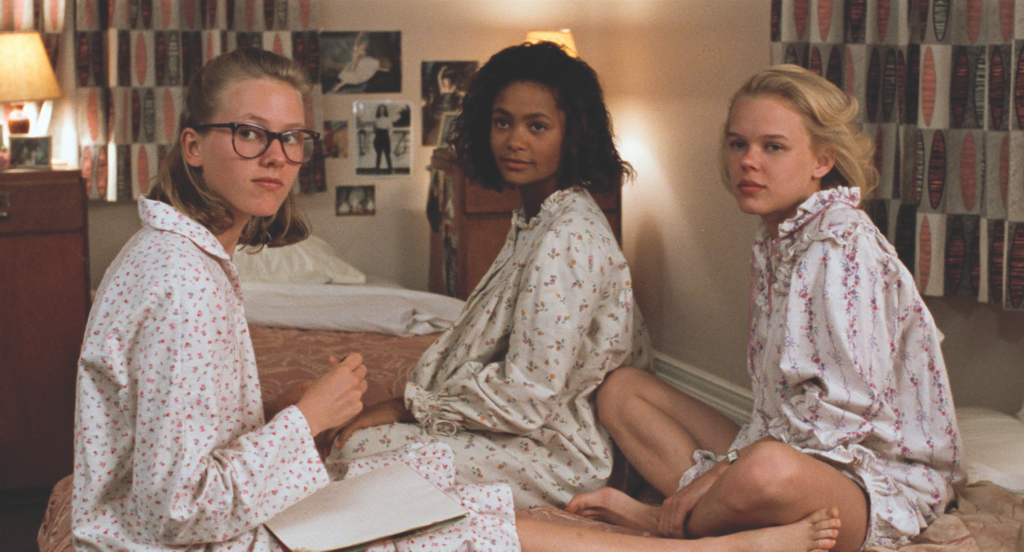
In a similar vein to its predecessor, which earned just over A$1.5 million at the Australian box office, Flirting also struck a chord with Australian film audiences, garnering A$1,655,044.[1]Film Victoria, ‘Australian Films at the Australian Box Office’, 2011, archived at <https://web.archive.org/web/20110723234802/http://film.vic.gov.au/resources/documents/AA4_Aust_Box_office_report.pdf>, accessed 2 October 2020, pp. 12, 23. Its success was recognised when it received six nominations at the Australian Film Institute (AFI) Awards, going on to win Best Film, Best Achievement in Editing (Robert Gibson), Best Achievement in Production Design (Roger Ford) and the AFI Members Prize. At the following year’s AFI Awards, Duigan was awarded the prestigious Byron Kennedy Award ‘for an impressive and original body of work both as writer and director, and through that work, his discovery and encouragement of new talent’.[2]Australian Film Institute, ‘The Byron Kennedy Award’, 2019, <https://s3-ap-southeast-2.amazonaws.com/aacta-org/Uploads/Byron-Kennedy-Award-Winners-1984-2019.pdf>, accessed 2 October 2020.
Alongside the accolades received in Australia, Flirting was also received well overseas. In the United States, where it earned an impressive US$2,415,396 at the box office, its commercial embrace was accompanied by a generally positive critical reception. Although Vincent Canby’s review for The New York Times described the film as ‘simultaneously attractive and just a little dull’, he noted the standout performances of Taylor and Newton.[3]Vincent Canby, ‘First Love and Sartre, as a Youth Grows Up’, The New York Times, 6 November 1992, <https://www.nytimes.com/1992/11/06/movies/review-film-first-love-and-sartre-as-a-youth-grows-up.html>, accessed 1 March 2021. The Washington Post was more magnanimous with its praise, with critic Desson Howe specifically commending Duigan for his ‘dark yet humanistic humor’.[4]Desson Howe, ‘Flirting’, The Washington Post, 20 November 1992 <https://www.washingtonpost.com/wpsrv/style/longterm/movies/videos/flirtingnrhowe_a0af3b.htm>, accessed 12 December 2020. Meanwhile, Roger Ebert was rhapsodic in his admiration of Flirting, concluding his review with:
Only rare movies like Flirting remind us that the movies are capable of providing us with the touch of other lives, that when all the conditions are right we can grow a little and learn a little, just like the people on the screen. This movie is joyous, wise and life-affirming, and certainly one of the year’s best films.[5]Roger Ebert, ‘Flirting’, RogerEbert.com, 20 November 1992, <https://www.rogerebert.com/reviews/flirting-1992>, accessed 29 September 2020.
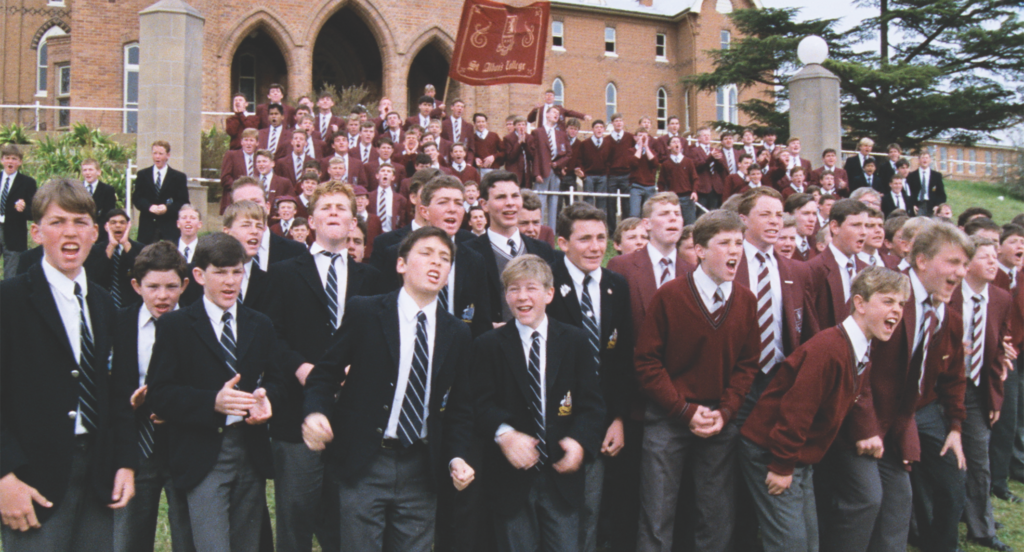
Despite such critical encouragement, as well as the film’s inclusion in the programs of international film festivals and receipt of awards, Flirting has become little more than a footnote in scholarly examinations of Australian cinema and, in many respects, has been relegated to the shadow of The Year My Voice Broke.[6]Flirting was brought back into popular consciousness in the last decade with Newton speaking publicly and painfully about the sexual relationship that she alleges she was coerced into with Duigan on the set of the film at the age of sixteen. See E Alex Jung, ‘In Conversation: Thandie Newton’, Vulture, 7 July 2020, <https://www.vulture.com/article/thandie-newton-in-conversation.html>; and Katie Glass, ‘The Interview: Thandie Newton, Actor’, The Sunday Times, 19 March 2017, <https://www.thetimes.co.uk/article/the-interview-thandie-newton-actor-2pr3v0lgf>, both accessed 1 March 2021. The 2017 digital restoration of Flirting by the National Film and Sound Archive of Australia (NFSA)[7]‘NFSA Restores’, National Film and Sound Archive of Australia website, <https://www.nfsa.gov.au/about/our-mission/nfsa-restores>, accessed 1 March 2021. addresses this oversight and affirms Flirting’s important position in Australia’s film history.
Interestingly, Flirting was originally written by Duigan seven years before the conception of The Year My Voice Broke, and he was able to secure the release of Flirting as a result of the popularity of the earlier film.[8]See Erin Free, ‘Ballad of Youth: The Making of Flirting’, FilmInk, 20 September 2017, <https://www.filmink.com.au/ballad-youth-making-flirting/>, accessed 1 March 2021. Although Duigan successfully achieved his goal of writing Flirting to ‘operate autonomously’ from The Year My Voice Broke,[9]John Duigan, quoted in Scott Murray, ‘John Duigan: Awakening the Dormant’, Cinema Papers, no. 76, November 1989, p. 34. his sequel nonetheless contains a number of traces that gesture towards the previous film. These include a black-and-white photograph of Danny’s first love, Freya (Loene Carmen), secreted within the pages of his copy of Jean-Paul Sartre’s Intimacy and Danny’s return to the familiar landscape of the first film at the conclusion of Flirting. While it is certainly possible to watch Flirting in isolation, knowledge of its protagonist’s backstory as a sensitive and romantic youth from The Year My Voice Broke enriches a viewing of Duigan’s sequel and its engagement with the past.
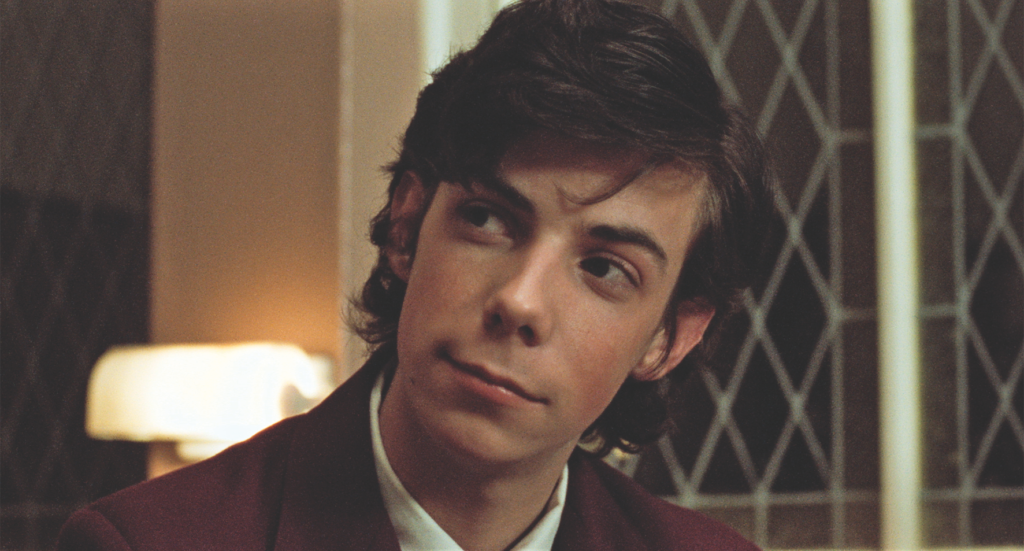
Framing memory
The opening sequence of Flirting immediately locates the viewer within a highly sensory narrative that is steeped in personal memory. As the credits appear on screen, the nocturnal soundscape of chirping crickets, mooing cows, baaing sheep and barking dogs, as well as the distant sound of a passing train and the warbling call of magpies, establishes the setting before the subtitle, ‘Rural Australia 1965’, confirms the film’s topography. As the camera slowly approaches St Albans at dusk, cinematographer Geoff Burton’s unsteady, handheld camerawork enacts the tentative passage into memory. The introduction of Danny’s voiceover narration provides this audiovisual recollection with the further dimensions of scent and touch:
I remember the smells most: stale lockers with fruitcakes rotting into the wood; crusty shoe polish; damp towels; Quink ink for fountain pens; disinfectant on the floors of the shower block; fresh chalk; mouldy oranges, blue with mildew; and, on a rainy day, the deep, rank, wild smell of discarded football boots. AndI remember pain, but only vaguely. I had a thick hide by then.
As the nostalgic odours of Danny’s boarding school give way to the physical memory of the beatings received at the hands of Mr Elliott, the handheld tracking shot of the boarding school is interrupted by flashes of white that mimic the impulse to shut one’s eyes upon receiving a blow. The film camera then transitions into the halls of St Albans, where it pans along the line of boys fearfully awaiting their meeting with Mr Elliott before Danny enters for his turn. Effectively interpolating the viewer into Danny’s perspective, the voiceover narration and the cinematography not only provide a gateway into his memories, but also reference Duigan’s own personal background. Having immigrated to Australia from England via Malaysia with his parents when he was twelve years old, Duigan attended boarding school in Geelong, memories of which he drew from for the scenes in which the boys line up to be caned and Mr Elliott prevents Danny from attending the school dance.[10]Free, op. cit.
Flirting has become little more than a footnote in scholarly examinations of Australian cinema and, in many respects, has been relegated to the shadow of The Year My Voice Broke
Although Duigan has disputed that Flirting is an entirely autobiographical account of attending boarding school in the 1960s, he has confirmed that he used the character of Danny ‘as a way of expressing the evolution of some of my ideas. But it’s only loosely based on my experiences.’[11]John Duigan, quoted in David Gritten, ‘Going Through the Years in Voice and Flirting: Movies: Writer-director John Duigan’s Trilogy Tackles the Formative Years of Growing Up in a Small Australian Town’, Los Angeles Times, 27 November 1992, p. 12, available at <https://www.latimes.com/archives/la-xpm-1992-11-27-ca-1060-story.html>, accessed 1 March 2021. By structuring the film as a mnemonic text that is based on personal recollection, rather than the present-time unfolding of events, Duigan employs the same temporal style as that in The Year My Voice Broke, which uses Danny’s voiceover to frame the film’s events. In her detailed analysis of The Year My Voice Broke in Metro, Rose Lucas writes that:
The ‘voice’ with which Danny narrates that time in his life is a more mature voice of experience and reflection; the film’s narrative charts the development of his voice from the introspective and naive to the voice of a young man who is able to integrate his experience rather than just be caught up in it.[12]Rose Lucas, ‘The Year My Voice Broke’, Metro, no. 171, Summer 2012, p. 116.
Similarly, in Flirting, Danny’s recounting of his time at boarding school possesses a reflective awareness that indicates that the fragments of memory are being assembled following the passage of some time. The film’s mnemonic textures, however, never cross over into the sentimental: even when Danny reflects on his relationship with Thandiwe, he comments that they never used the word ‘love’ because they were ‘too cool for that’.
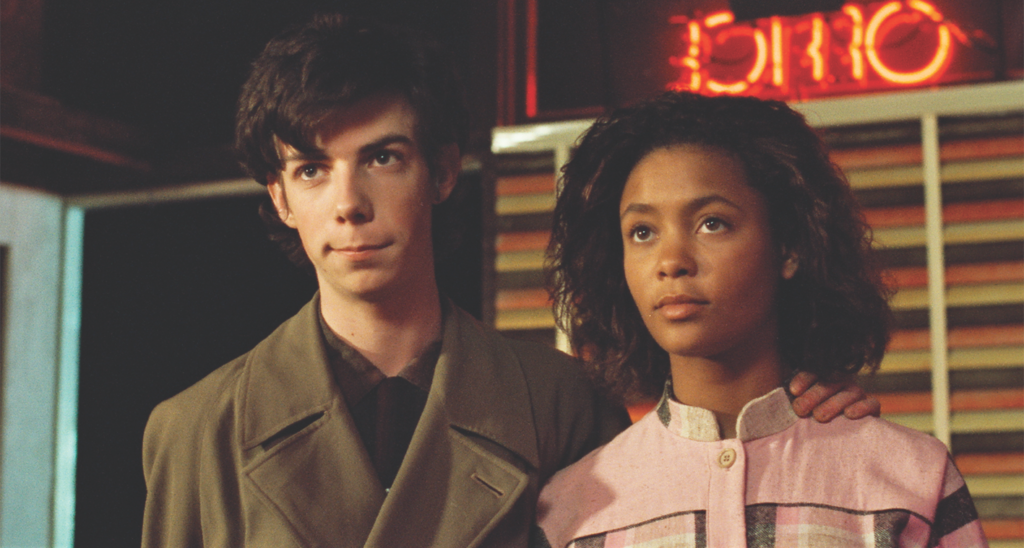
Although Danny asserts narrative authority over the film’s action, Duigan has acknowledged the film’s capacity to function as a time capsule and, in doing so, to evoke a sense of collective memory:
There are familiar echoes for most people from their teenage years. Most people’s teenage years are enormously rich because they are defined by such raw emotions. As we become older, we become used to the happiness and disaster. They become familiar, and the edge can sometimes be lost. It’s nice if someone can preserve the freshness of that. Adolescence is such a rich period … there’s intense misery, as well as intense joy. If a film taps into these experiences in an accessible way, it can really take people back.[13]John Duigan, quoted in Free, op. cit.
More than just capturing the transitory and highly emotive state of being a teenager, Flirting is replete with intertextual layers that evoke the period in which the film is set. While the soundtrack features songs such as The Troggs’ ‘With a Girl Like You’ and a hilarious a cappella rendition of The Coasters’ ‘Little Egypt (Ying-Yang)’ by the fourth-form St Albans boys in the dormitory showers, the film is also grounded in the sociohistorical events of the Vietnam War and the Buganda Crisis. While these references lend authenticity to the film’s context, pop music and political awareness also provide the frames of reference in which the film’s teenage characters operate. This is best demonstrated in the scene in which Thandiwe attempts to watch news coverage of the Vietnam War while her nemeses Fiona (Francesca Raft), Barbara (Lisa Spinadel) and Theresa (Louise Hannan) purposefully drown out the sound of the television by playing Joanie Sommers’ ‘Johnny Get Angry’ loudly on the record player. Quite unlike their teenage counterparts, who are predominantly obsessed with pop music and over-exaggerated gossip concerning their classmates, Danny and Thandiwe bond over the cerebral literature of Sartre and Albert Camus and an interest in the geopolitical state of the world outside Australia, creating an alternative space in which their attraction to each other develops.
A setting for transcendent desire
Despite the film’s focus on social realities, the filtering of the on-screen events through Danny’s individual subjectivity provides Flirting with a dreamy subconsciousness. For example, in one dream sequence, the viewer accompanies Danny as he leaves his sleeping body to float across the lake between the two schools and hover ‘like a dark angel’ above the grounds of Cirencester. Other scenes are also captured through the prism of Danny’s imagination, such as when he views Mr Elliott dressed up in Nazi regalia and has visions of Sartre and Sonny Liston during his doomed boxing match against ‘Backa’. While these magic-realist moments could easily be attributed to the film’s coming-of-age narrative and the manner in which teenagers often locate their place in the world through their imagination rather than reality, they also continue the ‘mystical view of the world’ that Duigan aimed to represent in The Year My Voice Broke.[14]Duigan, quoted in Murray, ‘John Duigan: Awakening the Dormant’, op. cit., p. 34.
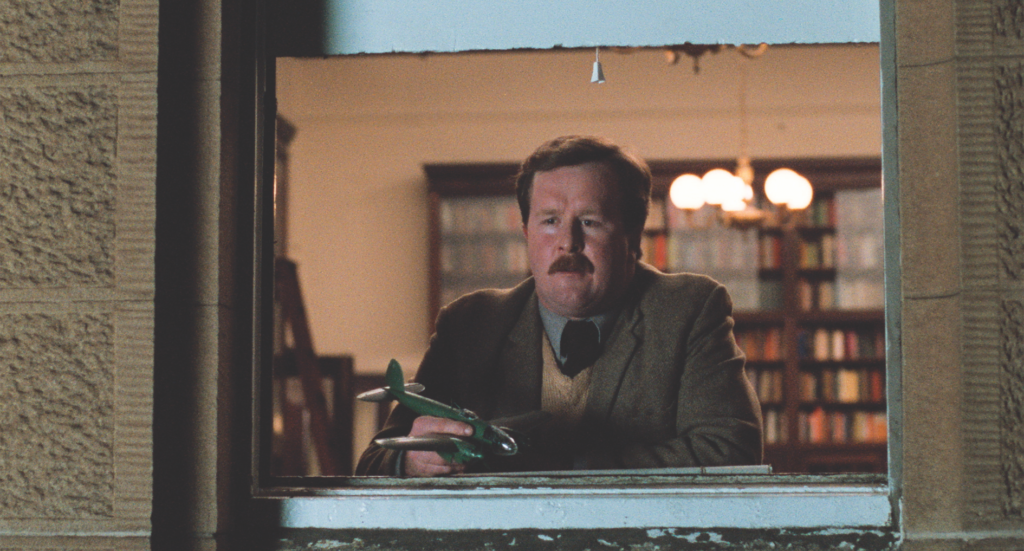
Significantly, when Duigan was asked while promoting Flirting to reflect on the reception of The Year My Voice Broke, he commented that he did not think the film was ‘adequately discussed’ in print media.[15]ibid. Expanding on this statement, he added that the film’s mysticism was overlooked in favour of the ‘rite-of-passage aspects’ – which, according to Duigan, are not what the film is about at all.[16]ibid. This approach of privileging the focus on the transitory period of adolescence in The Year My Voice Broke has largely been extended to readings of Flirting. In their respective studies, both Tom O’Regan and co-authors Albert Moran and Errol Vieth regard Flirting as a ‘coming of age’ film.[17]See Tom O’Regan, Australian National Cinema, Routledge, London & New York, 1996, p. 167; and Albert Moran & Errol Vieth, Film in Australia: An Introduction, Cambridge University Press, Port Melbourne, Vic., 2006, p. 181. Jonathan Rayner employs slightly different terminology in characterising the film as a ‘rite of passage’ narrative;[18]Jonathan Rayner, Contemporary Australian Cinema: An Introduction, Manchester University Press, Manchester & New York, 2000, pp. 142–3. however, this still accords with the generally accepted view that the thematic emphasis of Flirting is the vicissitudes of entering adulthood.
Arguably, analyses of Flirting, much like those of The Year My Voice Broke, have neglected to seriously consider one of the film’s strongest characteristics: namely, its re-creation of the singular and almost otherworldly space of adolescence. One exception is critic Raffaele Caputo, who writes that Duigan positions Danny and Thandiwe’s lives as though they ‘belong in between a recognisable reality and a mystical one, never quite settling […] Danny and Thandiwe are connected through an unworldly, unconsolidated view of the world.’[19]Raffaele Caputo, ‘Flirting’, in Scott Murray (ed.), Australian Film 1978–1994: A Survey of Theatrical Features, Oxford University Press, Melbourne, 1995, p. 313. In this reading, Duigan is less concerned with the actual end point of coming of age and more concerned with exploring the fleeting, emotional geography of being a teenager. The connection between Danny and Thandiwe to which Caputo alludes is borne out in their first interaction at a rugby match, in which Danny comments to Thandiwe and her friends Janet (Naomi Watts) and Melissa (Kym Wilson) that his interest in rugby is only ‘anthropological’ owing to its status as ‘a form of mating ritual’. While Janet and Melissa walk away, claiming that Danny is ‘deranged’ and ‘incredibly rude’ after he suggests that the only reason they are attending the match is to engage in this ritual themselves, Thandiwe casts an inquisitive backward glance in Danny’s direction.
The act of flirting, which implies a playful lack of commitment, does not adequately convey the depth of Danny and Thandiwe’s relationship. Rather, it encapsulates the teenage space of desire that they inhabit.
The dreamy and liminal perspective that Danny and Thandiwe share is also alluded to in the title of the film itself. However, the act of flirting, which implies a playful lack of commitment, does not adequately convey the depth of Danny and Thandiwe’s relationship. Rather, it encapsulates the teenage space of desire that they inhabit. When Thandiwe tells Gilby (Bartholomew Rose), Janet and Melissa that she and Danny are ‘just flirting’ when they are actually discussing African politics, Thandiwe skilfully excludes her peers from the map of desire that she and Danny are navigating. Indeed, while there are numerous couplings intimated in the film – such as St Albans head boy Jock (Felix Nobis) and Cirencester head girl Nicola (Nicole Kidman), as well as Gilby and Janet – it is only Danny and Thandiwe whose relationship transcends the small microcosm of the two boarding schools: both geographically, through their escape to the Motel Tropicana, and psychologically, through their movement beyond what Danny refers to as ‘the normal, grubby business of school and growing up’.
It is not just their peers who appear unable to comprehend and access the space within which Danny and Thandiwe’s relationship unfolds, but also – most notably – the adult teachers at both boarding schools. When not scarring the backsides of the St Albans boys, Mr Elliott spends his time cleaning his pipe, while Mr Cutts (Jeff Truman) is preoccupied with assembling model planes. The breadth of the worldview at Cirencester is slightly broader with Mrs Archer (Fiona Press) adapting the joint school play, ‘Proserpina’, ‘from the German’ herself. However, the adult characters seemingly exist to create boundaries that prevent the students from outgrowing the limitations regulated by school life. Underscoring a comment made by Duigan in an interview that he ‘loathed’ boarding school largely due to the teaching staff,[20]Duigan, quoted in Gritten, op. cit. Thandiwe confides in Danny that the schools are akin to ‘prisons’. By claustrophobically locating the majority of the film’s action in the boarding schools, Duigan replicates the often cosseted experience of growing up that the adult characters – in toying with model planes, or playing make-believe via a school play – are themselves lost within. Danny and Thandiwe’s removal from this space is best captured when they are discovered at the Motel Tropicana by bewildered school staff and Danny wryly remarks, ‘Aren’t they all funny?’ to which Thandiwe replies in resignation, ‘Aren’t they?’
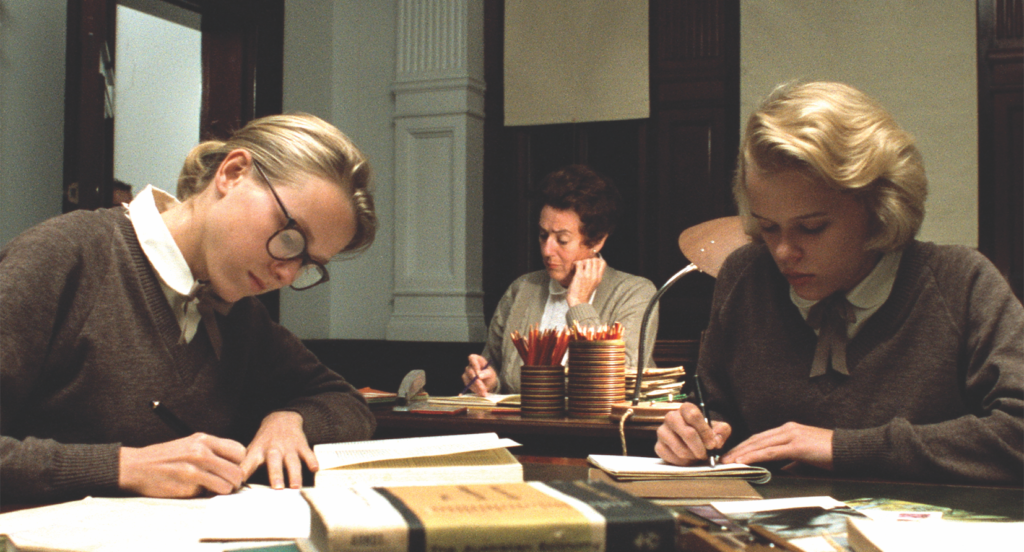
Although Flirting is narrated from Danny’s perspective, Duigan does not merely present a schoolboy’s fantasy of first love. From the moment Thandiwe argues at the inter-school debate that ‘most contemporary artists seem more interested in bodily functions’ and proceeds to quote from Willie Dixon’s ‘I Just Want to Make Love to You’ and Little Richard’s ‘Tutti-Frutti’, she is portrayed as self-determined and in control of her own sexuality. In Lorrie Palmer’s examination of the gender dynamics in Flirting, she compliments Duigan for accepting ‘human nature’ and exploring ‘a world in which independence and individualism apply to females of different races’.[21]Lorrie Palmer, ‘The Many Faces of Disinclination: Australian Feminist/Post-colonialist Reflections in Flirting’, Senses of Cinema, November 2007, <http://www.sensesofcinema.com/2007/australian-cinema-45/flirting/>, accessed 26 October 2020. Gilby’s comment to Danny about ensuring pleasure for the woman by remembering ‘her needs as well as yours’ is followed through in the film when the female characters are given permission to divulge their sexual desires. In this sense, the female characters’ desires are equally privileged in the narrative, such as when the seemingly uptight Nicola describes an illicit encounter with a tradesman leaving her ‘so shivery delicious all over’.
Crucially, Duigan does not fetishise the moment in the film when Danny and Thandiwe literally come of age by having sex. Instead, the camera cuts to a shot of the undulating hips of a Hawaiian hula doll on the front counter of the Motel Tropicana before the camera returns to Danny and Thandiwe kissing in bed. As the camera pulls back and soars above their figures, Danny and Thandiwe appear to no longer be at the motel, but moored to a space in which only they exist: a ‘sleepy lagoon’, to return to the metaphor offered in the first scenes of the film. The manner in which Danny and Thandiwe are visually isolated in this shot highlights Duigan’s interest in not only cinematically re-creating the private space of flourishing desire that belongs to teenagers, but also celebrating an interracial romance of marginalised bodies. Aligning with media researcher Leonie Rutherford’s delineation of the diverse films in Duigan’s oeuvre as being linked by ‘their depiction of characters who are outcasts’,[22]Leonie Rutherford, ‘Adolescence and Abuse: Trauma and the Socio-sexual Abject in John Duigan’s Lawn Dogs’, Metro, no. 158, 2008, p. 136. Flirting’s misfit protagonists – a young man who hardly accords with the stereotypical ideals of Australian masculinity and a young woman who is marked as different due to her skin colour – are allowed to fleetingly create their own intermediate space of desire despite the obstacles pitted against them.
Identity unfolding
Set at a point in Australia’s history when the country’s national identity was poised between a nascent sense of Australianness, a lingering conservatism from the legacy of British colonial subjugation and an opening up to the increased influence of American popular culture, Flirting not only provides the viewer with intimate access to Danny’s memories, but also sets up a parallel narrative that draws on the collective memory of Australia in the 1960s. Although critic Rochelle Siemienowicz distinguishes Duigan from other ‘Australian New Wave directors who came to prominence during the 1970s’ because his films are not ‘based on national historical events or adapted from Great Australian Novels, nor […] concerned with issues of national identity’,[23]Rochelle Siemienowicz, ‘Careless Love – An Interview with John Duigan’, AFI Blog, 10 May 2012, <https://blogafi.wordpress.com/2012/05/10/careless-love-an-interview-with-john-duigan/>, accessed 12 December 2020. Flirting nonetheless draws attention to and critiques the parochialism, ethnic exclusivity and discrimination embedded within Australian culture in the 1960s. Importantly, Duigan has acknowledged the interrogation of an insular Australian subjectivity in Danny’s journey through the film, describing it as
a series of broadening experiences, obviously on the romantic front […] But it’s also broadening in the sense that he’s coming to think of the wider world. Danny is from an isolated country town, but then he starts to think about the experiences of Thandiwe as an African, which is something that he hadn’t even contemplated before. There’s a montage of African events, and Danny starts to realise how – like so many people in Australia, or in England, for that matter – our knowledge about that continent was informed by superficialities. There are still residual colonial cliches.[24]Duigan, quoted in Free, op. cit.
The scene to which Duigan alludes juxtaposes Thandiwe’s recounting of her life in Africa with archival footage perpetuating stereotypes of savagery and scenes from the Tarzan films of the 1930s. While this montage leads Danny to the revelation that his comprehension of the continent is limited to ‘Tarzan comics and Hollywood movies’, the other characters are further away from enlightenment.
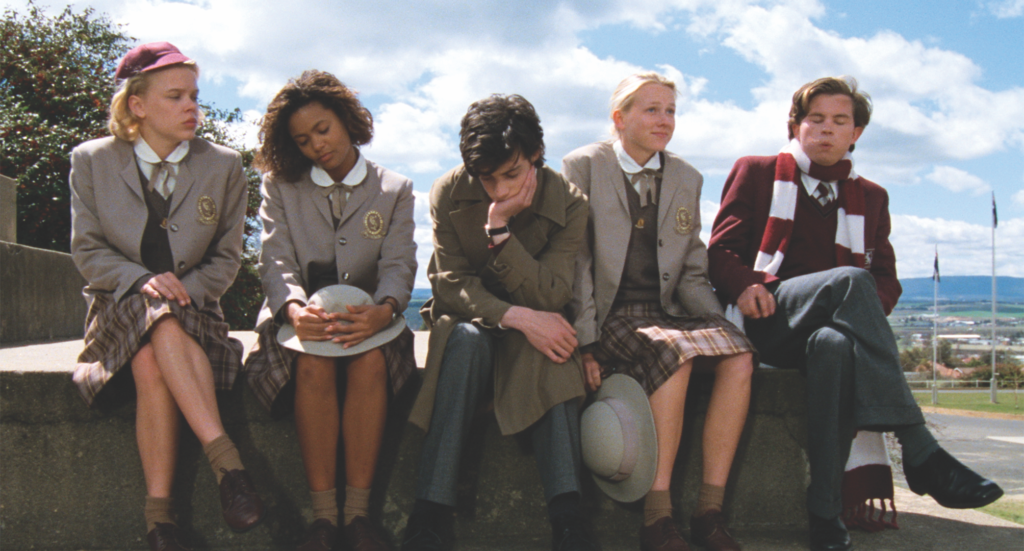
When Thandiwe arrives at Cirencester in the cover of night, she is not properly seen by the viewer until the next morning, when she is coolly observed by the girls in her dormitory as she lies asleep. The cruel comment ‘Anyone got a banana?’ rouses her from her sleep, setting the tone for her treatment by the majority of students at both Cirencester and St Albans. Indeed, throughout the film, Thandiwe is interchangeably referred to as a ‘boong’, an ‘Abo’, a ‘liquorice allsort’ and ‘lubra lips’, and even the seemingly intelligent Gilby assesses her based on race: ‘I know body language, and hers says, “Give me.” They can be pretty, you know, desperate these black women. Look at National Geographic.’ Duigan accentuates this myopic view of Africa by continually presenting the world beyond Australia in black-and-white. This visual effect not only is a realistic portrayal of televisual media at the time, but also emphasises the extremely narrow view of life outside Australia that is held by most of the students, as represented in the following exchange:
THANDIWE: There are other things going on in the world besides skinny rock’n’roll singers jumping around.
FIONA: Oh yes, of course, and little Miss Sophistication can tell us all about it.
THANDIWE: You never know; it might actually concern you.
FIONA: Well, I doubt if it’ll concern you. They’re certainly not going to mention Uganda.
THERESA: I’ve never heard it mentioned ever.
BARBARA: They’re not even in the Olympic Games, are they?
THERESA: Probably not eligible.
BARBARA: They would be for the zoo Olympics.
Although confronting, Duigan’s drawing attention to the entrenched racism of the 1960s, and the manner in which it is directed at Thandiwe, serves the purpose of highlighting the intertwinement of the personal and the global in Flirting. This is best evidenced in Thandiwe’s final letter to Danny at the conclusion of the film, in which she reveals that she and her family have fled to Nairobi, emphasising the impingement of world politics into the private life of an Australian – irrespective of the country’s seemingly comfortable isolation from the rest of the world. As Scott Murray highlights, Duigan displays an ‘interest in locating his stories within a specific political atmosphere, in such a way that politics is not just talked about but is seen to directly affect people’s lives’.[25]Scott Murray, ‘Australian Cinema in the 1970s and 1980s’, in Murray (ed.), Australian Cinema, Allen & Unwin, North Sydney, 1994, p. 97. The tangible evidence of Danny’s political awakening is seen in his bedroom in his parents’ home. The room, which he refers to as a ‘museum of desire’ in The Year My Voice Broke, has, by the end of Flirting, been transformed into a highly politicised space. Alongside a copy of Sartre’s Iron in the Soul and a typewriter, Danny’s desk now holds a book entitled A Short History of Africa, a photograph of Thandiwe and a book called Yulengor: Nomads of Arnhem Land.
A national coming of age
To return to the contention that Flirting is a coming-of-age film, it can more appropriately be viewed as a film that marks the coming of age of Australia. As Josephine May argues, ‘The film could be read as an allegory of the Australian transformative experience of the realignment of postwar global powers in a decolonising world.’[26]Josephine May, Reel Schools: Schooling and the Nation in Australian Cinema, Peter Lang, Bern, 2013, p. 168. Indeed, the attitudes developed by Danny foreshadow the dismantling of the White Australia Policy, which was led by the Holt government in 1966; the granting of civil rights to Indigenous people in 1967; and the eventual opening up of the country to mass migration.[27]See National Museum of Australia, ‘White Australia Policy’, <https://www.nma.gov.au/defining-moments/resources/white-australia-policy>, accessed 3 November 2020. The mildly awkward cultural clash when Danny’s and Thandiwe’s parents meet following the performance of ‘Proserpina’ gestures towards a mutual understanding when Thandiwe’s father, Solomon (Freddie Paris), comments on the difficulty of assimilating the trauma of having fought in a war – an affective moment that clearly touches Danny’s otherwise stoic father, Bruce (Malcolm Robertson).
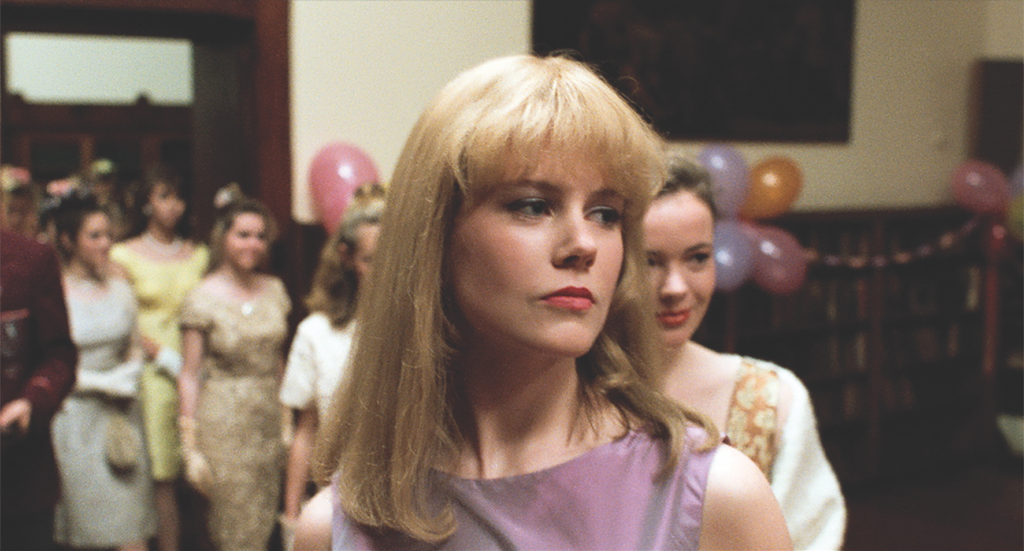
In many respects, Flirting accords with Ian Craven’s assessment of Australian cinema of the 1990s and its reflection of ‘structures and discourses fusing nostalgia for the heady days of the nationalist “renaissance” with a futuristic open-ness to the possibilities of the global’.[28]Ian Craven, ‘Australian Cinema Towards the Millennium’, in Craven (ed.), Australian Cinema in the 1990s, Frank Cass, London & Portland, OR, 2001, p. 2. The self-reflexive awareness that underscores the humour in Flirting and prevents it from taking a deep dive into rose-tinted nostalgia is notably what marks the film as Australian. Danny’s voiceover comment, ‘People wonder how Hitler managed to get so many followers – it’s never surprised me,’ sums up the tongue-in-cheek tone of the film that balances the humiliations and indiscretions of growing up against the sweetness of experiencing first love. In Stephen Hunter’s review for The Baltimore Sun, he notes that had Flirting been an American film, the trajectory would have been quite different. Specifically, he suggests that Danny would have won the boxing match against ‘Backa’ with a ‘knockout blow’, and his pairing with Nicola for the school play rehearsals would have displaced his romance with Thandiwe, who at that time thinks Danny has betrayed her.[29]Stephen Hunter, ‘Flirting, Gently Suffering the Sweet Pain of Youth’, The Baltimore Sun, 1 January 1993,<https://www.baltimoresun.com/news/bs-xpm-1993-01-01-1993001069-story.html>, accessed 10 November 2020.
The strength of Duigan’s portrayal of the romance between Danny and Thandiwe is that Flirting continues what Lucas describes as The Year My Voice Broke’s representation of the ‘cultural shift away from an anachronistic model of machismo and the primacy of masculine bonds’.[30]Lucas, op. cit., p. 117. Apart from breaking down masculine codes, the portrayal of a mixed-race relationship also represents a new dimension of Australian life. In Being Australian: Narratives of National Identity, Catriona Elder contends that cultural texts such as art, cinema and music ‘often explicitly aim to introduce people to stories of the nation’ and ‘seek to instruct and encourage feelings of Australian-ness’.[31]Catriona Elder, Being Australian: Narratives of National Identity, Allen & Unwin, Crows Nest, NSW, 2007, p. 181. Although the film’s representation of Danny aligns with what Andrew Zielinski refers to as the ‘myth of the underdog and battler’ that is a key characteristic of the Australian cinema that emerged in the late 1980s and 1990s,[32]Andrew Zielinski, ‘An Overview of Contrasting Spaces in Australian Feature Films’, Screen Education, no. 43, Spring 2006, p. 93. Duigan does not simply reinforce accepted ideas of national identity. Rather, in presenting a film narrative that resists the easy identification of traditional notions of white male mateship that are so often bound up with representations of Australia, Flirting can be viewed as a counter-narrative that seeks to integrate a global sensitivity into its conception of Australianness.
In the final scene of Flirting, Danny returns to the rocky outcrop high above the town where much of the action in The Year My Voice Broke took place to read a long-awaited letter from Thandiwe. As the camera reverses away from Danny, with his figure dwarfed by the landscape surrounding him, his voiceover confides, ‘Suddenly, there were much bigger worlds again, and some small place in them for me.’ The ending not only reinforces Danny’s renegotiation of his place in the world, but also hints at the final part of what Duigan had envisaged would be a trilogy of Danny’s life. Unfortunately, this as-yet-incomplete instalment, which Duigan had planned would conclude with Danny living and working in Paris,[33]Free, op. cit. may never come to fruition. Although this final piece is missing, from the vantage point of thirty years after the original release of Flirting, Danny can be plausibly regarded as one of the unassuming antiheroes of Australian cinema – and, along with the film, as holding a key place in the nation’s filmic coming of age.
Responding to the NFSA’s restoration of his film, Duigan stated:
The work of film preservation is of incalculable value to our culture. Without it whole swathes of our film heritage, including classics from the relatively recent past, may, sooner than we think, be lost forever.[34]John Duigan, quoted in ‘NFSA Restores’, op. cit.
As a fragment of Australian film heritage, Flirting reassembles personal memories to create a story of desire and identity formation that touches Australia’s collective history.
This article has been refereed.
Select bibliography
Vincent Canby, ‘First Love and Sartre, as a Youth Grows Up’, The New York Times, 6 November 1992, <https://www.nytimes.com/1992/11/06/movies/review-film-first-love-and-sartre-as-a-youth-grows-up.html>.
Raffaele Caputo, ‘Flirting’, in Scott Murray (ed.), Australian Film 1978–1994: A Survey of Theatrical Features, Oxford University Press, Melbourne, 1995, p. 313.
Roger Ebert, ‘Flirting’, RogerEbert.com, 20 November 1992, <https://www.rogerebert.com/reviews/flirting-1992>.
Erin Free, ‘Ballad of Youth: The Making of Flirting’, FilmInk, 20 September 2017, <https://www.filmink.com.au/ballad-youth-making-flirting/>.
Katie Glass, ‘The Interview: Thandie Newton, Actor’, The Sunday Times, 19 March 2017, <https://www.thetimes.co.uk/article/the-interview-thandie-newton-actor-2pr3v0lgf>.
David Gritten, ‘Going Through the Years in Voice and Flirting: Movies: Writer-director John Duigan’s Trilogy Tackles the Formative Years of Growing Up in a Small Australian Town’, Los Angeles Times, 27 November 1992, p. 12, available at <https://www.latimes.com/archives/la-xpm-1992-11-27-ca-1060-story.html>.
Desson Howe, ‘Flirting’, The Washington Post, 20 November 1992, <https://www.washingtonpost.com/wp-srv/style/longterm/movies/videos/flirtingnrhowe_a0af3b.htm>.
Stephen Hunter, ‘Flirting, Gently Suffering the Sweet Pain of Youth’, The Baltimore Sun, 1 January 1993, <https://www.baltimoresun.com/news/bs-xpm-1993-01-01-1993001069-story.html>.
E Alex Jung, ‘In Conversation: Thandie Newton’, Vulture, 7 July 2020, <https://www.vulture.com/article/thandie-newton-in-conversation.html>.
Rose Lucas, ‘The Year My Voice Broke’, Metro, no. 171, Summer 2012, pp. 114–20.
Albert Moran & Errol Vieth, Film in Australia: An Introduction, Cambridge University Press, Port Melbourne, Vic., 2006.
Scott Murray, ‘Australian Cinema in the 1970s and 1980s’, in Murray (ed.), Australian Cinema, Allen & Unwin, North Sydney, 1994, pp. 71–146.
Scott Murray, ‘John Duigan: Awakening the Dormant’, Cinema Papers, no. 76, November 1989, pp. 30–5, 77.
Tom O’Regan, Australian National Cinema, Routledge, London & New York, 1996.
Lorrie Palmer, ‘The Many Faces of Disinclination: Australian Feminist/Post-colonialist Reflections in Flirting’, Senses of Cinema, November 2007, <http://www.sensesofcinema.com/2007/australian-cinema-45/flirting/>.
Jonathan Rayner, Contemporary Australian Cinema: An Introduction, Manchester University Press, Manchester & New York, 2000.
Leonie Rutherford, ‘Adolescence and Abuse: Trauma and the Socio-sexual Abject in John Duigan’s Lawn Dogs’, Metro, no. 158, 2008, pp. 136–40.
Rochelle Siemienowicz, ‘Careless Love – An Interview with John Duigan’, AFI Blog, 10 May 2012, <https://blogafi.wordpress.com/2012/05/10/careless-love-an-interview-with-john-duigan/>.
MAIN CAST
Danny Embling Noah Taylor Thandiwe Adjewa Thandie Newton Nicola Radcliffe Nicole Kidman ‘Gilby’ Fryer Bartholomew Rose ‘Backa’ Bourke Josh Picker Jock Blair Felix Nobis ‘Slag’ Green Kiri Paramore Mr Morris Cutts Jeff Truman Mr Rupert Elliott Marshall Napier Melissa Miles Kym Wilson Janet Odgers Naomi Watts Mrs Archer Fiona Press
PRINCIPAL CREDITS
Year of release 1991 Length 99 minutes Director John Duigan Screenplay John Duigan Production Company Kennedy Miller Producers George Miller, Doug Miller & Terry Hayes Associate Producer Barbara Gibbs Director of Photography Geoff Burton Editor Robert Gibson Production Design Roger Ford Casting Liz Mullinar
Endnotes
| 1 | Film Victoria, ‘Australian Films at the Australian Box Office’, 2011, archived at <https://web.archive.org/web/20110723234802/http://film.vic.gov.au/resources/documents/AA4_Aust_Box_office_report.pdf>, accessed 2 October 2020, pp. 12, 23. |
|---|---|
| 2 | Australian Film Institute, ‘The Byron Kennedy Award’, 2019, <https://s3-ap-southeast-2.amazonaws.com/aacta-org/Uploads/Byron-Kennedy-Award-Winners-1984-2019.pdf>, accessed 2 October 2020. |
| 3 | Vincent Canby, ‘First Love and Sartre, as a Youth Grows Up’, The New York Times, 6 November 1992, <https://www.nytimes.com/1992/11/06/movies/review-film-first-love-and-sartre-as-a-youth-grows-up.html>, accessed 1 March 2021. |
| 4 | Desson Howe, ‘Flirting’, The Washington Post, 20 November 1992 <https://www.washingtonpost.com/wpsrv/style/longterm/movies/videos/flirtingnrhowe_a0af3b.htm>, accessed 12 December 2020. |
| 5 | Roger Ebert, ‘Flirting’, RogerEbert.com, 20 November 1992, <https://www.rogerebert.com/reviews/flirting-1992>, accessed 29 September 2020. |
| 6 | Flirting was brought back into popular consciousness in the last decade with Newton speaking publicly and painfully about the sexual relationship that she alleges she was coerced into with Duigan on the set of the film at the age of sixteen. See E Alex Jung, ‘In Conversation: Thandie Newton’, Vulture, 7 July 2020, <https://www.vulture.com/article/thandie-newton-in-conversation.html>; and Katie Glass, ‘The Interview: Thandie Newton, Actor’, The Sunday Times, 19 March 2017, <https://www.thetimes.co.uk/article/the-interview-thandie-newton-actor-2pr3v0lgf>, both accessed 1 March 2021. |
| 7 | ‘NFSA Restores’, National Film and Sound Archive of Australia website, <https://www.nfsa.gov.au/about/our-mission/nfsa-restores>, accessed 1 March 2021. |
| 8 | See Erin Free, ‘Ballad of Youth: The Making of Flirting’, FilmInk, 20 September 2017, <https://www.filmink.com.au/ballad-youth-making-flirting/>, accessed 1 March 2021. |
| 9 | John Duigan, quoted in Scott Murray, ‘John Duigan: Awakening the Dormant’, Cinema Papers, no. 76, November 1989, p. 34. |
| 10 | Free, op. cit. |
| 11 | John Duigan, quoted in David Gritten, ‘Going Through the Years in Voice and Flirting: Movies: Writer-director John Duigan’s Trilogy Tackles the Formative Years of Growing Up in a Small Australian Town’, Los Angeles Times, 27 November 1992, p. 12, available at <https://www.latimes.com/archives/la-xpm-1992-11-27-ca-1060-story.html>, accessed 1 March 2021. |
| 12 | Rose Lucas, ‘The Year My Voice Broke’, Metro, no. 171, Summer 2012, p. 116. |
| 13 | John Duigan, quoted in Free, op. cit. |
| 14 | Duigan, quoted in Murray, ‘John Duigan: Awakening the Dormant’, op. cit., p. 34. |
| 15 | ibid. |
| 16 | ibid. |
| 17 | See Tom O’Regan, Australian National Cinema, Routledge, London & New York, 1996, p. 167; and Albert Moran & Errol Vieth, Film in Australia: An Introduction, Cambridge University Press, Port Melbourne, Vic., 2006, p. 181. |
| 18 | Jonathan Rayner, Contemporary Australian Cinema: An Introduction, Manchester University Press, Manchester & New York, 2000, pp. 142–3. |
| 19 | Raffaele Caputo, ‘Flirting’, in Scott Murray (ed.), Australian Film 1978–1994: A Survey of Theatrical Features, Oxford University Press, Melbourne, 1995, p. 313. |
| 20 | Duigan, quoted in Gritten, op. cit. |
| 21 | Lorrie Palmer, ‘The Many Faces of Disinclination: Australian Feminist/Post-colonialist Reflections in Flirting’, Senses of Cinema, November 2007, <http://www.sensesofcinema.com/2007/australian-cinema-45/flirting/>, accessed 26 October 2020. |
| 22 | Leonie Rutherford, ‘Adolescence and Abuse: Trauma and the Socio-sexual Abject in John Duigan’s Lawn Dogs’, Metro, no. 158, 2008, p. 136. |
| 23 | Rochelle Siemienowicz, ‘Careless Love – An Interview with John Duigan’, AFI Blog, 10 May 2012, <https://blogafi.wordpress.com/2012/05/10/careless-love-an-interview-with-john-duigan/>, accessed 12 December 2020. |
| 24 | Duigan, quoted in Free, op. cit. |
| 25 | Scott Murray, ‘Australian Cinema in the 1970s and 1980s’, in Murray (ed.), Australian Cinema, Allen & Unwin, North Sydney, 1994, p. 97. |
| 26 | Josephine May, Reel Schools: Schooling and the Nation in Australian Cinema, Peter Lang, Bern, 2013, p. 168. |
| 27 | See National Museum of Australia, ‘White Australia Policy’, <https://www.nma.gov.au/defining-moments/resources/white-australia-policy>, accessed 3 November 2020. |
| 28 | Ian Craven, ‘Australian Cinema Towards the Millennium’, in Craven (ed.), Australian Cinema in the 1990s, Frank Cass, London & Portland, OR, 2001, p. 2. |
| 29 | Stephen Hunter, ‘Flirting, Gently Suffering the Sweet Pain of Youth’, The Baltimore Sun, 1 January 1993,<https://www.baltimoresun.com/news/bs-xpm-1993-01-01-1993001069-story.html>, accessed 10 November 2020. |
| 30 | Lucas, op. cit., p. 117. |
| 31 | Catriona Elder, Being Australian: Narratives of National Identity, Allen & Unwin, Crows Nest, NSW, 2007, p. 181. |
| 32 | Andrew Zielinski, ‘An Overview of Contrasting Spaces in Australian Feature Films’, Screen Education, no. 43, Spring 2006, p. 93. |
| 33 | Free, op. cit. |
| 34 | John Duigan, quoted in ‘NFSA Restores’, op. cit. |
